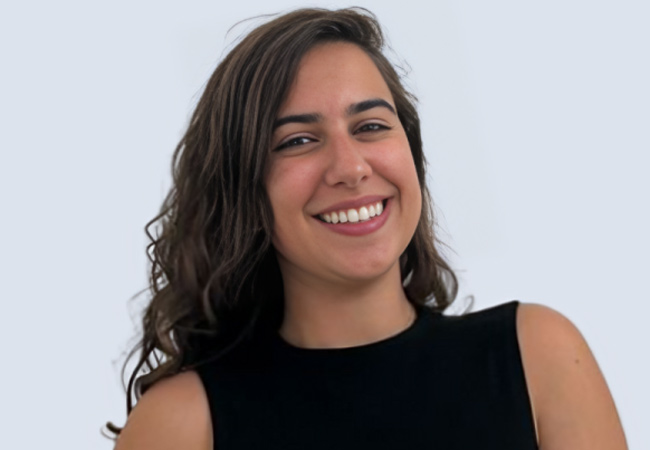
As Yorkville University prepares to celebrate its Spring 2025 Convocation in Fredericton next month, we will be highlighting each of this year’s Student Graduate Speakers.
The speaker representing this year’s Master of Arts in Counselling Psychology (MACP) graduating class is Baneh Biltaji – a storyteller, healer, and advocate whose journey from the theatre stage to the counselling room reflects a deep commitment to creative and community-based care.
A Palestinian-Jordanian immigrant and first-generation master’s graduate, Baneh has spent their life exploring the powerful intersection between art and healing. What began as a passion for performance evolved into a profound calling: to help others process trauma, emotion, and identity through experiential and somatic therapies. Deeply rooted in justice and inclusion, Baneh’s work centres marginalized voices, especially those of 2SLGBTQIA+ individuals, immigrants, and refugees.
At Yorkville, Baneh found a place to grow academically, emotionally, and professionally – a space where her love of artistic expression could meet the science of the human mind. Now, as they look ahead to building a creative, trauma-informed practice, they carry forward a clear purpose: to honour the stories that often go unheard.
Baneh recently sat down to discuss their journey, what inspired them to pursue counselling, and what comes next. Here’s what she had to say:
What brought you to Yorkville University? Where were you in your life/career when you decided to continue your studies with us?
I had graduated with a Bachelor of Fine Arts in theatre performance and then pursued the first level of a Drama Therapy certification. I was feeling like I wanted to learn more, but I was unsure of where the journey would take me. The drama therapy workshops highly resonated with me. But I do need to give my mom credit here, as she encouraged me to think about what I wanted to do with my passion for the healing power of art. I came to Yorkville University after many conversations with her about the possible routes I could take to truly understand the mind and make a difference in my greater community.
What made you decide to pursue your Master of Arts in Counselling Psychology?
The ultimate goal was to find a way to make a difference in the world around me using the skills I spent my whole life honing: performance art. I knew that art had a healing power for me, but I wanted to know more about how the mind actually worked and what exactly about art helped me heal? After reading about the program, I knew it would be a great way to answer those questions and pursue that ultimate goal. I really would not have been able to find the bravery to pursue it without my family, mentors, and fiancé. I remember my mom looking me in the eye and saying, “This is the perfect time to do this, and you can do it, I know you can!”– and for that I am eternally grateful.
What is the most important thing you’re taking away from your studies at Yorkville University?
There are so many things, but one thing I have expressed many times to my loved ones is that being a counsellor is an honour. I learned that through my trials with peers, my dyadic partner supervision throughout practicum, and through the therapist friendships I have forged during my time at Yorkville. We all experienced this unique intimacy between counsellor and client. An intimacy not based in sexuality, sensuality, friendship, or family ties. An intimacy that is based on dedicating our lives to creating safe spaces for clients to say things that they may not even admit to themselves at first. What a true honour it is to be the person who holds space for thoughts that are otherwise lost. Also, through those relationships with peers, I was able to learn that there are infinite ways to approach an obstacle…and if I can’t help a client, there are many wonderful peers who I can rely on who will be more than capable!
What are your plans after graduation, both immediate and long term?
Take a long nap, get married, and move somewhere warmer! But also, open a remote private practice, pursue further training in experiential therapy and go for that full drama therapy certification. Long term, I would love to create a performance art therapy space to provide mental health services to underserved communities. It is my dream to be able to host large groups of people for sessions that provide a creative format for healing and expression. I am passionate about finding ways to address the mental health needs of communities that struggle with verbal expression.
If you offered one piece of advice to an incoming student, what would that be?
I would say to truly solidify your “Why?” and “Who?”. Knowing why you chose to pursue this career and degree. Also, who are you hoping to serve? Or who are you doing this for? There may be moments where you feel like you are lost because you are learning so many new concepts. There may be moments where it feels like a challenge that you cannot overcome. But in those moments, take the time to remember your “Why?” and “Who?” This could help ground you and propel you forward. You are going to do amazing things with your degree one day!






